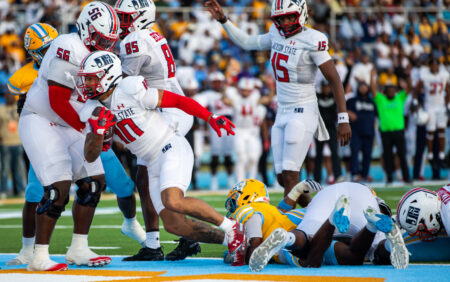Notice: Trying to get property 'post_title' of non-object in /home/ofzfvenynm4q/public_html/wp-content/plugins/wp-rss-feed-to-post/includes/wprss-ftp-display.php on line 109
Doctors learned early in the pandemic that COVID-19 was more than a respiratory disease. It was attacking bodily organs, including the heart — even in healthy, young athletes.
Enough athletes with COVID were experiencing heart inflammation, called myocarditis, that doctors at the University of Maryland and other Big Ten schools didn’t want to take any chances.
Advertisement
Myocarditis already was seen as one of the leading causes of sudden death in elite athletes, so doctors across the conference immediately imposed official protocols that kept some players off the fields for up to six months. Some grumbled, but everyone recovered.
“They could be walking time bomb and we’d only find out retrospectively,” said Dr. Yvette Rooks, who oversees care for more than 530 athletes on 19 teams as head team physician at the University of Maryland, College Park. “Some had symptoms and many did not. This really could save lives.”
Advertisement
The doctors also started taking a deeper look into the chests of each student-athlete testing positive for COVID-19 starting in the early months of the pandemic, eventually reviewing some 1,600 cases.
As they learned more about the risks, doctors scaled back intense testing and reduced the length of time out of play. But a registry created from the athletes’ health data is now poised to help the doctors understand more about the longer-term cardiovascular effects of COVID-19.
Doctors and researchers at the University of Maryland and other Big Ten schools plan to follow the athletes even after graduation to better understand the consequences of COVID-19 on the heart, said Rooks, also a clinical assistant professor of family and community medicine at the university’s school of medicine and a co-investigator on the registry.
The registry has specific findings from several tests, including MRIs, which are not typically performed on people testing positive for COVID-19. The detailed images found 37 cases of myocarditis, though only eight of those athletes had cardiovascular symptoms.
Lacrosse player Jack Brennan was one of the asymptomatic cases. While home in Rochester, New York, in December 2020, he took a COVID-19 test so he could visit his grandparents and was surprised it came back positive. He was even more surprised when he returned to College Park in January 2021 and an MRI found swelling around his heart.
He was frustrated to sit out the spring 2021 season, but with time and learning about the seriousness of the condition, he became more understanding.
He was cleared by the fall of 2021 to return to play, and now 21, he’s eligible to compete as an intercollegiate athlete for two more years, instead of one. (The Big Ten gave athletes who missed a season under the more extensive timeouts an extra year of eligibility.)
“I didn’t know what to think or what it was at first. All I heard was, ‘You’re not allowed to play,’ and I did give them a hard time, because I was impatient,” Brennan said. “But I’m not an expert. You have to listen to the doctors.”
Advertisement
And he’s glad they’re using his records to keep looking at the long-term effects.
“If they can figure out the process you go through, figure out how myocarditis affects athletes, that would be helpful,” Brennan said. “No one really knows the long-term effects yet.”

Among the things researchers want to know is whether damage or scarring will ever cause issues and when and what is the cardiovascular tie to so-called long COVID, where symptoms persist well after an infection. Another lingering question is whether those who had asymptomatic cases, like Brennan, should be concerned.
Early indications show that mild cases with no symptoms won’t be an issue, said Dr. Matthew Martinez, past chair of the American College of Cardiology’s Sports & Exercise Cardiology Section. He’s not involved in the Big Ten registry.
Martinez studied data from a larger subsequent registry of athletes that found up to 15% developed myocarditis after COVID-19 infections, but there were no cases of sudden cardiac death.
The study concluded that the intense across-the-board testing done by the Big Ten, specifically the use of MRIs, was needed only when athletes had cardiac symptoms or other heart tests were abnormal.
Advertisement
Further, Martinez said, returning recovered athletes to play faster was safe in most cases.
Martinez said, however, the abundance of caution taken for all the athletes wasn’t a bad idea when no one knew what to expect from the new virus.
“It’s really important to know,” said Martinez, also medical director of Atlantic Health System Sports Cardiology at Morristown Medical Center in New Jersey. “We’re all learning this on the fly. There is a measure of relief across the athlete community.”

Going forward, Martinez said, athletic programs ought to have a plan for athletes who develop heart issues on the field, including increasing access to defibrillators across all playing arenas.
He said that cardiac testing, even an MRI, is needed when athletes have symptoms such as pressure in their chests, fast heart rates or breathlessness, or if they later develop those symptoms.
He also said there should be study of protections from vaccines against myocarditis, which appears to be significant, as well as the risk from the vaccines themselves, which seems minimal. None of the Big Ten athletes developed the condition after the vaccinations.
Advertisement
Chicago Tribune Sports
Weekdays
A daily sports newsletter delivered to your inbox for your morning commute.
Martinez hopes there is a continued “focus on health and safety for athletes, including cardiovascular health.”

Big Ten researchers say studies are underway using the registry data, and that others are planned.
Dr. Geoffrey Rosenthal is a professor of pediatrics in University of Maryland’s School of Medicine and chief of pediatric cardiology at University of Maryland Medical Center. He is serving as coordinator of six “core labs” that make up the registry. That’s where data from specific tests are housed so they are uniformly interpreted. The epidemiology and cardiac MRI labs are housed in Maryland’s medical school, while the overall registry is based at the Ohio State University.
Rosenthal said answers to the doctors’ questions will come in time. But he already had immediate advice for the general population.
“One of the biggest takeaways for the athletes and the general population is that the best way to protect one’s heart is to get vaccinated and get boosted when it’s time,” he said. “The second public health message for people who have or had COVID: If they have heart palpitations or chest pain, they should seek medical attention.”
The researchers also were glad they have a bank of MRI data that identified all the myocarditis cases, even the asymptomatic ones. That offers a unique opportunity for researchers, said Dr. Jean Jeudy, professor of diagnostic radiology and nuclear medicine at the Maryland medical school. He leads the cardiac MRI core lab for the registry.
Advertisement
“It will be important for us to follow these student-athletes over time to determine whether mild myocarditis has any permanent impact on their heart health,” he said, “and how any findings may apply to the general population that tends to be older and sicker than these athletes.”







